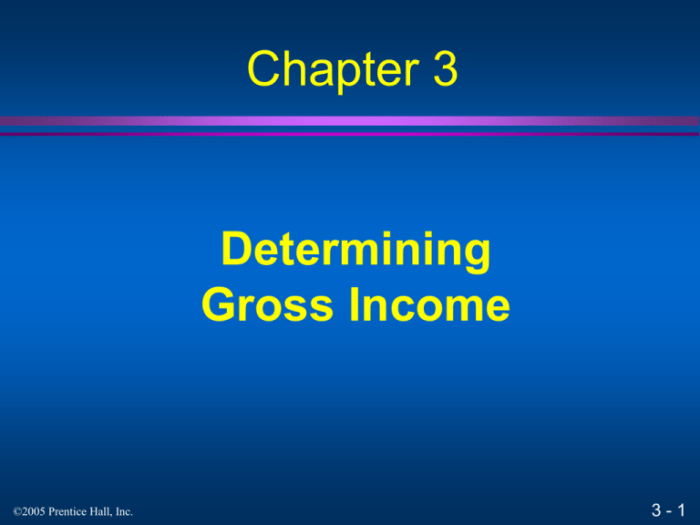Chapter 1 Gross Income Answer Key unlocks the intricacies of gross income, providing a comprehensive guide to its definition, calculation methods, exclusions, and reporting requirements. This fundamental concept forms the cornerstone of tax reporting, shaping an individual’s tax liability and overall financial planning.
Delving into the nuances of gross income, this chapter explores the various types of income that fall under its umbrella, including wages, salaries, tips, and investments. It clarifies the distinction between taxable and non-taxable income, highlighting the role of deductions and adjustments in reducing the overall tax burden.
1. Gross Income Definition and Scope: Chapter 1 Gross Income Answer Key
Gross income encompasses all income an individual or entity receives from various sources during a specified tax period. It serves as the foundation for calculating taxable income and determining tax liability. Gross income includes earnings from employment, business operations, investments, and other sources as defined by tax laws.
The types of income that fall under gross income vary depending on the specific tax jurisdiction and the nature of the income source. Generally, gross income includes:
- Wages, salaries, and other compensation from employment
- Net income from self-employment or business operations
- Investment income, such as dividends, interest, and capital gains
- Rental income from property
- Royalties from intellectual property
Certain types of income are excluded from gross income, such as tax-exempt interest, gifts, and inheritances. Additionally, deductions and adjustments can reduce gross income to arrive at taxable income.
2. Methods for Calculating Gross Income

There are two primary methods used to calculate gross income: the cash basis method and the accrual basis method.
Cash Basis Method
Under the cash basis method, income is recognized when it is actually received in cash or its equivalent. Expenses are deducted when they are actually paid. This method is commonly used by individuals and small businesses.
Accrual Basis Method, Chapter 1 gross income answer key
Under the accrual basis method, income is recognized when it is earned, regardless of when payment is received. Expenses are deducted when they are incurred, regardless of when they are paid. This method is typically used by larger businesses and corporations.
The choice of accounting method can impact the timing of income and expense recognition, which can affect tax liability.
3. Gross Income Exclusions
Certain types of income are excluded from gross income, reducing the amount of income subject to taxation. These exclusions include:
- Tax-exempt interest, such as interest from municipal bonds
- Gifts and inheritances
- Life insurance proceeds
- Scholarships and fellowships
- Certain disability benefits
Exclusions are intended to provide relief from taxation on certain types of income, such as gifts and inheritances, which are not considered to be earned income.
4. Taxable Income and Its Relation to Gross Income

Taxable income is the amount of gross income that is subject to taxation. It is calculated by subtracting deductions and adjustments from gross income.
Deductions are expenses that are allowed to be subtracted from gross income, such as business expenses, charitable contributions, and mortgage interest. Adjustments are specific items that are added or subtracted from gross income to arrive at taxable income.
Taxable income is significant because it determines the amount of tax liability an individual or entity owes.
5. Gross Income Reporting Requirements
Individuals and entities are required to report their gross income on tax returns. The specific forms used to report gross income vary depending on the type of taxpayer and the tax jurisdiction.
Accurate and timely reporting of gross income is essential to ensure compliance with tax laws and avoid penalties. Common errors in gross income reporting include failing to report all sources of income and claiming ineligible deductions.
6. Gross Income and Tax Planning
Understanding gross income can help individuals and entities plan their tax strategies. By minimizing gross income and maximizing deductions, taxpayers can reduce their tax liability.
Tax planning strategies may include:
- Deferring income to future tax periods
- Accelerating deductions to the current tax period
- Choosing the most advantageous accounting method
- Utilizing tax-advantaged investments and retirement accounts
Effective tax planning can help taxpayers minimize their tax burden while remaining compliant with tax laws.
FAQ Guide
What is the significance of gross income in tax reporting?
Gross income forms the basis for calculating taxable income, which ultimately determines an individual’s tax liability.
How does the cash basis method differ from the accrual basis method in calculating gross income?
The cash basis method recognizes income when cash is received, while the accrual basis method recognizes income when it is earned, regardless of receipt.
What are some common types of income excluded from gross income?
Tax-exempt income, such as municipal bond interest and certain retirement distributions, is excluded from gross income.